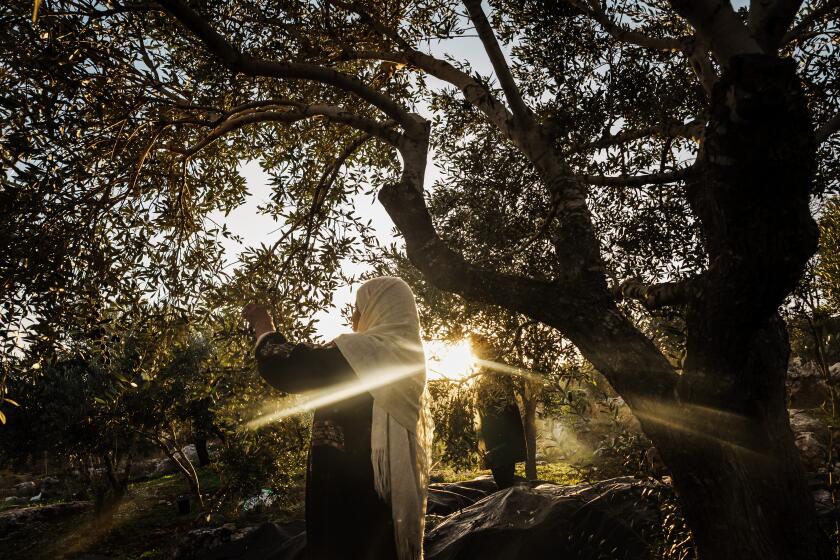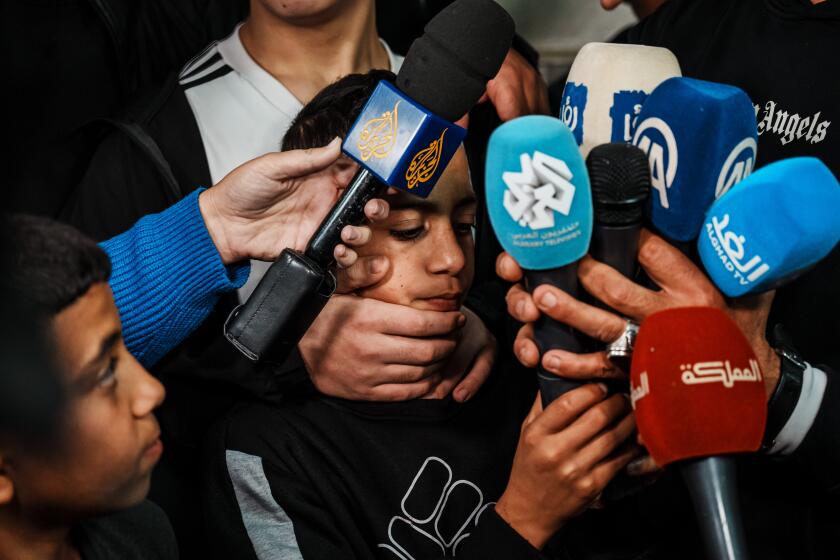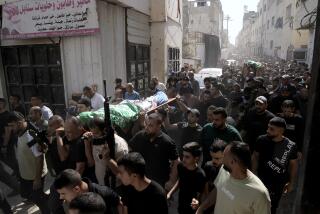Jordanians protest nightly against peace deal with Israel amid anger over Gaza war

- Share via
AMMAN, Jordan — It’s become a ritual for 35-year-old Anas Nayef: Every night he and several friends drive an hour and a half to this well-appointed neighborhood in Jordan’s capital a mile from the Israeli Embassy — as close as authorities will allow. They join thousands in pro-Palestinian demonstrations that last into the early morning before ending in low-grade tussles with security forces.
Their demands? Ending Jordan’s nearly 30-year-old peace deal with Israel and the normalization of relations that followed.
“There are demonstrations where we live, but this is the biggest one in the country,” Nayef explained on his 15th consecutive night of protest. “Of course we have to be here.”
Behind him, a group of men hoisted a bullhorn-wielding friend on their shoulders to lead a call-and-response.
“Normalization is ...,” he bellowed.
“Treason,” the crowd replied.
“The embassy is ...”
“Treason.”
“The economic deals are ...”
“Treason.”
More than six months into the war in the Gaza Strip, Arab governments that signed peace deals with Israel find themselves excoriated by populations enraged that their leaders are not joining the fight against a country they say is committing genocide against those many consider as compatriots.
There have been pro-Palestinian demonstrations across the Middle East. In Jordan, the cause has special resonance. Palestinians make up at least 2 million of the country’s 11 million people, and a frequent chant at the nightly protests is: “Who said we are separate? Jordan’s blood is for Palestine.”
As Israeli settlers use the war in Gaza as a pretext for a land grab in Palestinians’ other territory, olive farmers fear their way of life may be on the verge of extinction.
The normalization of relations with Israel in 1994 has always been deeply unpopular here. Still, the agreement has kept the peace and allowed for economic cooperation on water, natural gas and electricity.
The war threatens to upend all that.
The Israeli ambassador left Jordan soon after Oct. 7, when Hamas operatives attacked southern Israel and killed roughly 1,200 people.
In November, Jordan recalled its ambassador to Israel because of what it called an “unprecedented humanitarian catastrophe” in Gaza, where authorities say Israel has killed more than 33,000 people in its retaliatory invasion. Jordanian officials said the envoy would not return until the war is over and instructed Israel to not send back its ambassador until then.
Later that month, Jordan backed out of a water-for-energy deal brokered by the United Arab Emirates, with Jordanian Foreign Minister Ayman Safadi saying, “Can you imagine a Jordanian minister sitting next to an Israeli minister to sign the deal while Israel is killing our people in Gaza?”
In interviews, Jordan’s Queen Rania — who is of Palestinian origin — has accused Israel of genocide, while King Abdullah II has castigated the West, saying it maintains a double standard when it comes to Palestinian lives.
Meanwhile, Jordan spearheaded airdrops of aid into Gaza, with Abdullah donning a military uniform and getting on a C-130 plane to deliver the assistance. The local media billed the mission as the king “defying” the siege on the enclave, despite it being done in coordination with Israel.
Those moves have not placated the protesters, who have been demonstrating intermittently since October and have transformed their activity into a daily presence since March 24. They continue to insist the Israeli Embassy should be shuttered.
“Do we think our protests directly stop the genocide?” said Maasa, a 25-year-old psychiatry student, who worried that publishing her full name would invite reprisals from authorities. “No. But this is about trying to protect our country too and end normalization.
“It also encourages people in other Arab countries with peace deals, like in Egypt, to do the same,” she said.
Others accuse the Jordanian government of helping the UAE and Israel conduct trade in the face of a Red Sea blockade by the Houthi rebels in Yemen. Goods travel overland through Jordan and Saudi Arabia.
Jordan’s critics also rebuke the government for stationing soldiers and police along the 192-mile-long border with Israel and placing security personnel along the main roads near the Israeli Embassy — deriding those moves as working in the interests of Israel.
Other points of contention include the presence of American military personnel and U.S. bases in the country and the arrests of hundreds of activists during protests over the last month.
The recent hostage-for-prisoner swaps between Hamas and Israel have focused attention on the number of Palestinian minors imprisoned by Israel.
Somewhere in the crowd, a man shouted support for Hamas’ military wing, the Qassam Brigades: “Gaza is our cause! Al Qassam is our army! Hamas is our movement!”
The crowd repeated his words.
Upon hearing the chant, Nayef turned to a reporter and explained why protesters sided with Hamas.
“It’s because armies in Arab nations are with the Americans,” he said. “They aren’t meant to defend us. They don’t defend our civil rights, let alone our political rights.”
A coffee shop worker and university student named Jasser joined the conversation, straining to make himself heard above the noise of the crowd: “These protests are the least we can do, to show the people of Gaza that we too are besieged by the authorities and wish we were with them.”
Pro-Hamas rhetoric has aroused suspicion among Jordan’s leaders, who have accused protesters of acting as provocateurs beholden to “outside agendas.”
Writing in local media outlets in the last week, pro-government commentators launched broadsides against the demonstrations, saying they have been weaponized in the service of the Muslim Brotherhood, a powerful opposition group, or Iran to foment unrest and topple the government.
Those fears have only been strengthened by calls from Hamas leaders for Jordanians to rise up and fight against Israel, along with a statement last week from the head of the Iraqi Shiite militant group Kataib Hezbollah saying it was ready to arm 12,000 Jordanians to help disrupt trade between the UAE and Israel.
In interviews, demonstrators rejected the notion of the protests being about allegiance to Hamas or other Iran-backed groups.
“We are with the resistance in general, in all of its different types,” said Widad Daanah, an architect in her 50s and a regular presence in the protests.
“I’m with any liberation movement, regardless of its leanings,” she said, explaining that, as someone with a secular mind-set, she was not a typical Hamas supporter. “I may not be with their methods and thinking, but in the broad outlines I’m with them.”
Rand Khattari, a physician, insisted the target wasn’t the government.
“Whether these protests are useful or useless, I don’t care,” she said. “I want them to send a message to Israel, that regardless of what our governments do, it won’t matter.”
“People won’t accept. We’ll teach our kids to be even more vicious about this and reject them.”
More to Read
Sign up for Essential California
The most important California stories and recommendations in your inbox every morning.
You may occasionally receive promotional content from the Los Angeles Times.













